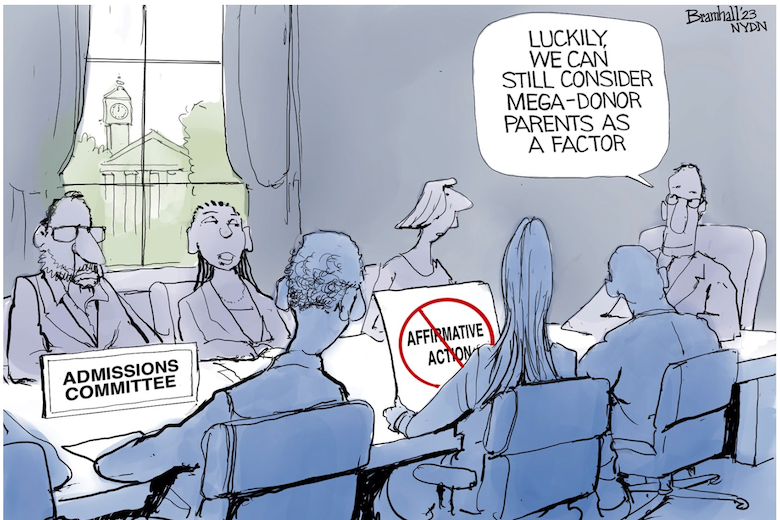The US Supreme Court has struck down the use of race as a factor in considering applications for all colleges and universities in the US. This was not entirely unexpected given the court”s ideological leanings, but it was disappointing nonetheless.
But when it comes to elite educational institutions, there is one very large group of people who have been getting preferential treatment in admissions but the legitimacy of which has not been subject to legal review and that is the preference given to so-called “legacy admissions” (applicants whose families have attended that school) and children of wealthy donors, all of whom are able to gain admission with lower academic performances. Preferences are also given to students who have athletic or other extra-curricular success. And the overwhelming majority of such people are white, making this, in effect, affirmative action for white people.
But those preferences are now coming under greater scrutiny.
In the wake of a Supreme Court decision that strikes down affirmative action in admissions, colleges are coming under renewed pressure to put an end to legacy preferences – the practice of favoring applicants with family ties to alumni. Long seen as a perk for the white and wealthy, opponents say it’s no longer defensible in a world with no counterbalance in affirmative action.
…“Now more than ever, there’s no justification for allowing this process to continue,” said Viet Nguyen, a graduate of Brown and Harvard who leads Ed Mobilizer, a nonprofit that has fought legacy preferences since 2018. “No other country in the world does legacy preferences. Now is a chance to catch up with the rest of the world.”
Using the Supreme Court decision as a catalyst, Nguyen’s group is rallying the alumni of top colleges to press their alma maters to end the practice. The goal is to get graduates of the 30 schools to withhold donations until the policy ends. The schools include Harvard and the University of North Carolina, which were at the center of the court case, along with the rest of the Ivy League and the University of Southern California.
…In the hazy world of college admissions, it’s unclear exactly which schools provide a legacy boost and how much it helps. In California, where state law requires schools to disclose the practice, USC reported that 14% of last year’s admitted students had family ties to alumni or donors. Stanford reported a similar rate.
At Harvard, which released years of records as part of the lawsuit that ended up before the Supreme Court, legacy students were eight times more likely to be admitted, and nearly 70% were white, researchers found.
An Associated Press survey of the nation’s most selective colleges last year found that legacy students in the freshman class ranged from 4% to 23%. At four schools – Notre Dame, USC, Cornell and Dartmouth – legacy students outnumbered Black students.
…Some prestigious colleges have abandoned the policy in recent years, including Amherst College and Johns Hopkins University. In the first year after dropping it, Amherst saw its share of legacy students in the freshman class fall by about half, while 19% of first-year students were the first in their families to attend college, the most in the school”s history.
There is also action on the legal front.
Lawyers for Civil Rights, a nonprofit based in Boston, filed the suit Monday on behalf of Black and Latino community groups in New England, alleging that Harvard’s admissions system violates the Civil Rights Act.
…The new lawsuit draws on Harvard data that came to light amid the affirmative action case that landed before the Supreme Court. The records revealed that 70% of Harvard”s donor-related and legacy applicants are white, and being a legacy student makes an applicant roughly six times more likely to be admitted.
…The suit alleges that Harvard’s legacy preference has nothing to do with merit and takes away slots from qualified students of color. It asks the U.S. Education Department to declare the practice illegal and force Harvard to abandon it as long as the university receives federal funding. Harvard did not immediately respond to a request for comment on the lawsuit.
Just as the overturning of Roe v. Wade by the Supreme Court resulted in a nationwide upsurge is support for abortion rights, it is likely that the end of affirmative action will lead to a similar backlash, this time against legacy admissions.



“Now is a chance to catch up with the rest of the world”
Haaaaaaaaaaahahahaha.
It’ll take a lot more than that.
Diversity will take a major hit if you eliminate smug, entitled, insufferable brats.
The dirty secret about legacies is that very few people want them to go away – not white applicants, nor Asians, nor any under-represented minority. Lots of people say that they want to end legacy admissions but I suspect that is just out of some form of political correctness (for lack of a better term). The part that few people will say out loud is that they see something in it for themselves. It is true that today the main beneficiaries of legacy admissions are white applicants but potentially anyone could benefit down the line. If your kid gets into Harvard then his/her kids will have a leg up. I can see this in the Indian community – most people are vociferously against affirmative action and were cheering on the plaintiffs. When reminded that legacy preferences are doing more to prevent Asians from getting in to these schools than affirmative action ever could, they will nod their heads and say something must be done about that as well – but the enthusiasm just isn’t there.
Legacy admissions are a way of giving inheritable status to children of the wealthy. But this crux has been looming for some time -- egalitarians have been pushing for diversity and equality in admissions -- so what are the wealthy and powerful going to do? Simple: they will be offered a cushy job at mommy/daddy’s foundation or corporation, get private education, and jump right onto the nepo baby track at TED or Davos. This has actually been going on for some time -- and it may work out worse for us all, since oligarch spawn will jump into entrepreneurship or the political aspirant class (e.g: the Kennedys) and they will bypass having to actually learn how to hire someone to take their exams and write their papers -- they’ll just run for office like Sarah Huckabee Nepo Baby Sanders did. Basically, the ancien régime will resurrect itself, hereditary aristocrats that won’t even bother to pretend, anymore. Besides, all that pretend meritocracy didn’t work particularly well, anyway.
The whole purpose of inheritable wealth is to facilitate the establishment of dynastic aristocracies. If we stop falling for it, they’ll just shrug and stop pretending.
You bring up a subtle but very clear point about sports. Why are universities and colleges acting as free farm teams and free training for sports? They enroll “students” who aren’t interested in learning anything, are often disruptive to the students going there to get an education, take resources from students who are paying to learn, and often don’t even finish their education because they’re only there to get some age and experience under their belt before they go pro (or not--the vast majority of “student” athletes never make it to the big leagues).
I just looked this up: only 14 out of 120 schools make money from their athletic programs. So the schools are losing money, short-changing their “student” athletes, and short-changing the students who pay tuition only to see it going to the losing proposition (that is, sports).
I just looked this up: only 14 out of 120 schools make money from their athletic programs.
Athletic programs don’t necessarily have to be profitable -- their point is to spend the money not recoup it. That’s an old trick -- Hollywood does it, too, as does the publishing industry. Sure, it’s great when the occasional best-seller makes it big, but that mostly funds many less successful books, movies, sports teams. The point is that money gets spent and there is an entire economy around them either way. In the case of college sports, any financial losses are self-generated under their control: they could instantly be hugely profitable if they cut their expenses. They don’t because the objective is to spend as much as possible -- winning or profit are secondary goals.
For example, that is why hollywood keeps making multi hundred million dollar blockbusters. As we have seen from Netflix, BBC, etc- it’s possible to make film entertainment for a lot less, but Michael Bay wants big expensive explosions, the SFX companies do too, and audiences like them too -- so you have a $150mn movie that loses money and has a huge $50mn boxoffice, only fully paying for itself 10 years later. The point is that the movie got made, or the college spent $150mn on a sportsball arena so the fans can have comfy seats and good snacks.
The question to ask is not if the teams are profitable, but how big is the financial diversion from the university’s main purpose. Looked at that way a typical university is a real estate holding company, a sports franchise, and an investment bank -- which has a small side-business teaching a few people about physics.
Or, you could look at it this way: the purpose of a university is to provide education, preparing students for future lives that include jobs that allow them a middle-class existence and paying taxes to support the state in which they live.
Instead of admitting students who are capable of great achievements in the fields of science, math, the humanities, politics or languages with just a little bit of a financial boost, far too many schools are recruiting and giving full rides to people who want to handle balls for a living for millionaire and billionaire team owners. Once these students are bribed, the schools provide them with privileged housing, food, training and medical care. The more egregious cases include luxury vacations and paid escorts. Most of these pampered elites will not even be successful in their sports that the schools use the actual students’ tuition to provide free for the athletes, and the ones who are moderately successful will wash out with physical injuries and brain damage after a short career.
No other country in the world does legacy preferences.
I dunno diddly about it, but I find that very hard to take seriously in the British and French contexts particularly.
@ 8 Pierce
Don’t know about UK or France but I was shocked when I heard about legacy admissions but I’m from Canada I would not be terribly surprised if one or two applicants get special consideration. Child of a PM or cabinet minister but not too likely otherwise . Certainly no formal program.
I suspect the effort goes into making sure little johnney or little mary gets the high school grades that gets them into the university of choice.
@7:
… over the course of which they will likely earn double digit millions of dollars. So, yeah, “wash out”.
Seriously -- present a poor, probably black kid with this explicit offer: play ball for five to ten years. Get brain damage. Die young… but leave your wife and kids as millionaires. It’s a testament to the state of the country that I think you’d still get people lining up for that.